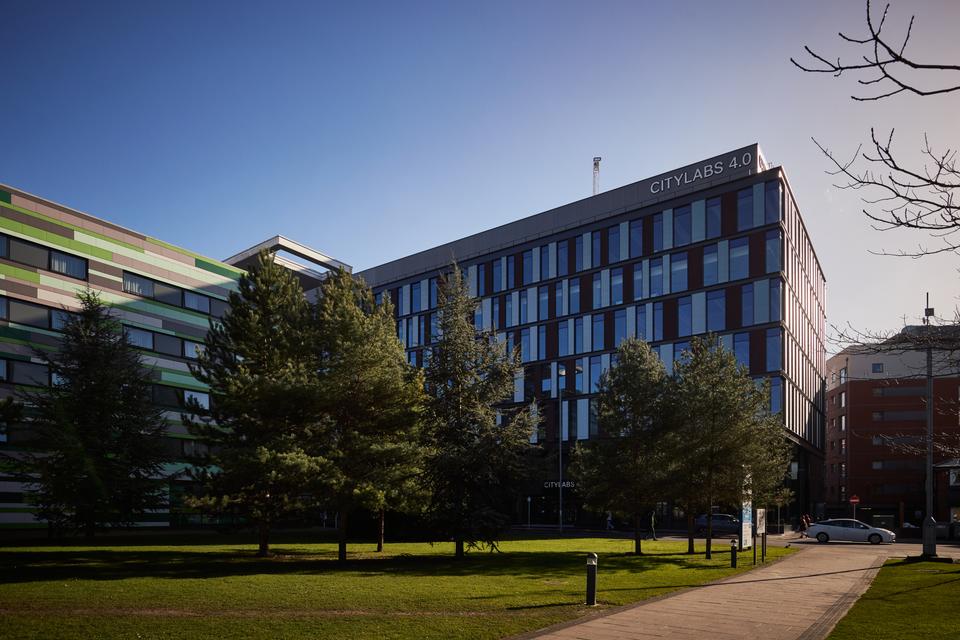Why Global Companies Are Looking To Manchester To Set Up Their European Base
By Bruntwood SciTech

Manchester has firmly established itself as one of Europe’s leading destinations for global business. With exceptional connectivity, a thriving innovation ecosystem, and one of the UK’s fastest-growing economies, the city continues to attract international corporations looking to set up their European base.
From its world-class universities to the strength of its science, technology, and financial sectors, Manchester combines talent, infrastructure, and opportunity - making it a city built for global growth.
Manchester’s Strategic Connectivity
Manchester’s transport links make it one of the best-connected cities in the UK. London and Birmingham are just two hours away by train, while Leeds can be reached in under an hour and Edinburgh in three. Within the city, an expanding Metrolink network and well-connected bus routes make travel efficient and sustainable.
Manchester Airport connects businesses to more than 200 destinations worldwide, including major hubs across Europe, North America, and Asia, with ongoing investment ensuring world-class facilities. Nearby motorways, including the M60 and M6, provide quick access to other major northern cities and Bruntwood SciTech’s suburban campuses.
Future developments such as Northern Powerhouse Rail will further enhance links between Manchester, Liverpool, Leeds, and Sheffield, strengthening the city’s status as a gateway for international business.
Access to Highly Skilled Talent Pool
Manchester is home to two world-renowned universities: The University of Manchester and Manchester Metropolitan University, which produce a continuous pipeline of skilled graduates in fields such as technology, finance, engineering, and healthcare.
The University of Manchester, ranked 8th in the UK and 56th globally by Times Higher Education in 2025, has produced 25 Nobel Prize winners and maintains strong research ties with industry. The nearby University of Salford, University of Bolton, and Lancaster University further expand this talent pool.
This concentration of talent has attracted global names such as Roku, who chose Circle Square for its proximity to the universities, and SafetyCulture, who established their base at Bond to access Manchester’s exceptional talent.
A Hub for Innovation: Manchester’s Diverse Business Ecosystem
Manchester is a hub of innovation, with businesses thriving across life sciences, digital technology, finance, and manufacturing. A recent JLL report ranked Manchester 14th out of 41 European life science clusters, recognising its growing role as a global research and innovation centre.
Major players such as Qiagen and Sai Life Sciences have established key European bases in Bruntwood SciTech’s Citylabs and Alderley Park campuses, joining a network that fosters collaboration between science, technology, and business.
The city also leads the UK in financial and professional services outside London, with over 2,000 firms including PwC, Deloitte, and KPMG. Meanwhile, Manchester’s creative and digital sectors continue to accelerate, with support from the Manchester Digital network and the city’s 2021-2026 digital strategy driving innovation and growth.
This ecosystem is anchored by Bruntwood SciTech’s innovation campuses in Circle Square, Manchester Science Park, Citylabs, and Sister (previously ID Manchester), creating a connected corridor of collaboration in the city’s Oxford Road Knowledge Quarter.
Infrastructure Supporting Growth and Innovation
High-speed broadband, 5G connectivity, and cutting-edge digital infrastructure give businesses based in Manchester the tools to operate globally.
MediaCityUK, home to the BBC and ITV, remains the heart of the UK’s creative and broadcasting industries, while the Oxford Road Knowledge Quarter unites academia, enterprise, and innovation in one of the most dynamic business districts in Europe.
Bruntwood SciTech’s campuses, including Bond, Bloc, 111 Piccadilly, Manchester One, and the latest iterations, Pall Mall and King’s House, offer the modern facilities, sustainability features, and community spaces that innovative companies need to thrive.
At Manchester Science Park, the new Greenheys development will soon welcome UK Biobank, the world’s most significant health research resource, further cementing Manchester’s global influence in life sciences.
Government Support and Strategic Initiatives
Government-backed programmes continue to fuel Manchester’s growth and innovation. The Northern Powerhouse Initiative invests in skills, transport, and business development to build a globally competitive northern economy.
Similarly, the Manchester Innovation Activities Hub (MIAH), supported by £4m from the Government’s Getting Building Fund and a £15.5m loan from the North West Evergreen Fund, provides vital workspace for science and technology businesses, encouraging collaboration and accelerating commercialisation.
Meanwhile, the Greater Manchester Local Enterprise Partnership (LEP) offers funding, mentorship, and support to help innovative businesses scale. These initiatives ensure the city remains a magnet for global investment and a model for public-private collaboration.
Case Study: The Launch of Sister
Sister, formally known as ID Manchester, represents the city’s next major leap forward. A £1.7 billion partnership between The University of Manchester and Bruntwood SciTech, this project is transforming a former academic campus into a world-leading innovation district and neighbourhood.
Opening in 2024, the Renold Innovation Hub offers coworking spaces, labs, and collaboration opportunities for researchers, entrepreneurs, and startups. Sister will host leading catalysts such as:
Turing Innovation Catalyst (TIC): Accelerating AI start-ups and collaborative research.
Christabel Pankhurst Institute: Advancing health technology research in partnership with the NHS and local government.
Industrial Biotechnology Innovation Catalyst (IBIC): Connecting universities and industry to advance biotech innovation.
With tailored training, mentorship, and access to expert networks, Sister will create a thriving community for businesses at every stage of growth - shaping the discoveries and technologies that define the future.
Why Manchester is the Perfect European Base
Manchester offers a powerful combination of connectivity, innovation, and talent. Global companies are choosing the city for its unrivalled transport links, world-class research institutions, and business ecosystem that fosters collaboration and growth.
From established corporations to emerging innovators, businesses thrive here because Manchester is more than a location - it’s a community built to support ambition.
Join the growing number of companies calling Manchester home and explore our Manchester workspaces today.
Related articles

Puma to Open New UK HQ in Manchester at Bruntwood SciTech’s Circle Square to Support Increased Innovation and Performance Drive

Bruntwood SciTech Complete £580m Sustainability-Backed Facility To Support Future Growth Projects In The Knowledge Economy

Citylabs 4.0 Officially Opens, Further Strengthening Manchester’s Life Sciences Ecosystem